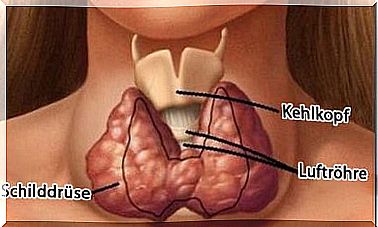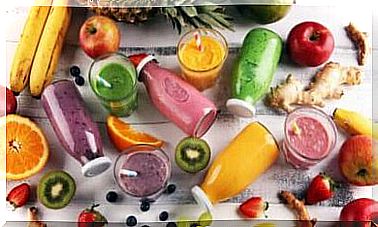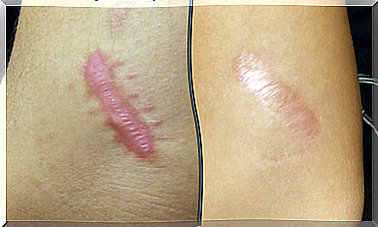6 Diets To Control Irritable Bowel Syndrome
Changing your diet is fundamental if you suffer from irritable bowel syndrome. It is a very common disease that we will talk about in our article today.

Irritable bowel syndrome is a functional disorder of the bowel in which it is very important to change your diet in order to control the symptoms. In our article you will find 6 different diets that have been shown to be efficient. Read on to learn how eating right can help you control irritable bowel syndrome.
It is predominantly women under the age of 45 who suffer from this syndrome, but it can also affect men and the elderly. Typical symptoms are abdominal colic, gas, constipation, diarrhea and other indigestion.
As mentioned earlier, it is a common disease and the exact causes are not yet known. If you think you have irritable bowel syndrome, you will need to get examined by a specialist.
Diets to control irritable bowel syndrome
Symptoms of irritable bowel syndrome can be very uncomfortable, so experts recommend changing your diet, but there is no consensus on which diet will work best.
Mostly experts give the following advice:
- Do not completely eliminate foods from your diet unless recommended by your doctor.
- Avoid carbonated drinks.
- Limit your consumption of fatty foods.
- Incorporate more fiber into your diet.
- Avoid lavish, rich foods.
- Drink two to three liters of water a day.
- Avoid legumes, cruciferous vegetables, and other gasifying foods.
- You should also avoid tobacco and alcohol.
Irritable bowel syndrome control diet needs to be personalized and tailored to each patient. Get help from your doctor or nutritionist.
1. Low FODMAP diet to control irritable bowel syndrome
One possible form of nutrition is the low-FODMAP diet, which contains only a few short-chain carbohydrates. These include oligosaccharides, disaccharides, monosaccharides, and fermentable polyols.
How Can This Diet Help Control Irritable Bowel Syndrome Symptoms? It’s simple: Many people don’t properly absorb simple carbohydrates in the small intestine. These therefore continue to nourish the intestinal bacteria in the colon (colon), which can cause discomfort.
Various research shows that avoiding these carbohydrates can relieve the symptoms, as it prevents the fermentation of the food by the intestinal bacteria. However, there are no conclusive studies on it.
At the beginning of the year, the Sociedad Española de Patología Digestiva (Spanish Society for Digestive Diseases ) reported an initial phase in which FODMAP foods are very strictly reduced for 4 to 8 weeks. Afterwards, these foods are gradually reintroduced into the diet in order to test the tolerance and to create a diet that is as less restrictive as possible.
Note: As this is a very restrictive diet, it must always be monitored by a doctor or nutritionist. The possible risks and benefits must be weighed.
2. Lactose-free diet to control irritable bowel syndrome
If the doctor suspects lactose intolerance, the diet can be adjusted accordingly for one to two months to see whether the symptoms go away. After that, foods containing lactose can be slowly reintroduced to observe the body’s reactions.
In many cases , irritable bowel syndrome is linked to lactose metabolism problems, so a lactose-free diet can often relieve the symptoms.
3. Gluten free diet

Various studies show that an estimated 30 percent of people with celiac disease are initially diagnosed as having irritable bowel syndrome. For this reason, the doctor may recommend a gluten-free diet in case of suspicion to check whether it is really celiac disease.
4. Diet against constipation
If you have irritable bowel syndrome with chronic constipation, experts may recommend adding enough insoluble fiber to your diet to improve intestinal transit. These are found in vegetables and whole grains, for example.
When constipation and diarrheal episodes alternate, you should include soluble fiber in your diet on a regular basis. You can find these in, for example, oats and barley, seeds and fruits.
5. Diet against diarrhea

In order to control irritable bowel syndrome, the diet must also be adapted in some cases to diarrhea episodes. It is a very common symptom that requires attention as it interferes with the absorption of important nutrients.
If you have diarrhea on a regular basis, avoid coffee and alcohol because they stimulate the bowel. You should also be careful with dairy products. Don’t forget to include other sources of calcium in your diet, such as soy milk or sesame milk.
6. Other recommendations for controlling irritable bowel syndrome
It is impossible to make a list of the foods that are beneficial for all people with irritable bowel syndrome. As already mentioned, every person reacts differently and therefore the diet must be adapted accordingly to the individual symptoms and complaints.
However, we have then put together a selection of foods that are divided into the groups “recommended”, “partially recommended” and “not recommended”. This list was drawn up by the Servicio de Endocrinología y Nutrición del Hospital Clínico Universitario de Valladolid (Department of Endocrinology and Nutrition of the University Hospital of Valladolid) in Spain.
Recommended foods:
- Whole grain bread, wheat bran and whole grain cereals
- Whole eggs
- fruit and vegetables
- Skimmed dairy products
- Lean meat
- Dried fruits
- White fish
- Olive oil in modest quantities
- water
- Herbal teas
Restricted recommended foods:
- Blue fish
- Sausages
- legumes
Not recommended foods:
- Bloating vegetables, such as cauliflower or broccoli
- Fat cheeses and whole dairy products
- Red meat and sausages
- Sandwich bread
- Butter and margarine
- Spicy dishes
- Purchased sauces
- coffee
- alcohol
- Carbonated drinks
Note: First it must be tested whether there are any food intolerances. It is possible that some patients cannot tolerate products listed in the “Recommended foods” group. These are general lists only, but not everyone.
Before you change your diet, you should get a medical exam. An expert can make an accurate diagnosis and advise you on what to eat to control irritable bowel syndrome.









